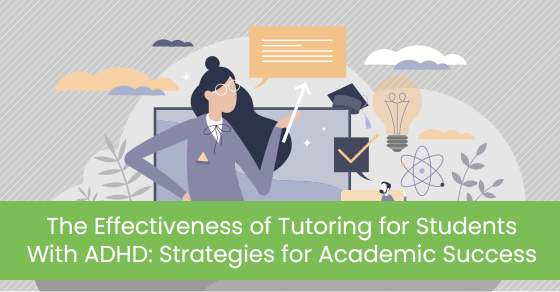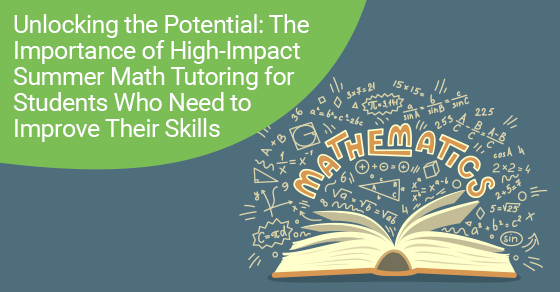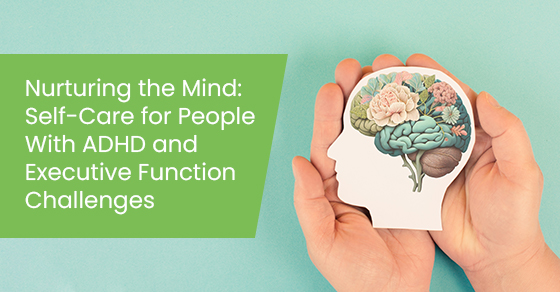People with attention deficit hyperactivity disorder (ADHD) often face unique challenges in their academic and personal lives. While not classified as a learning disability, ADHD can significantly impair a student’s learning abilities, as the combination of poor executive control, impaired working memory, and inattention hinders the encoding, memory formation, and recall processes in the brain, leading to poor academic performance and learning challenges.
Students with ADHD often process information more slowly than their peers and struggle with executive function skills, which are essential for effective reading, writing, and problem-solving. Additionally, learning strategies, study skills, and organizational abilities may be compromised. These difficulties can lead to underperformance in various academic areas, increased anxiety, frustration, and low self-esteem. Tutoring is a powerful tool for addressing these issues and helping students with ADHD succeed and thrive in the classroom and other areas of their lives.
Tutoring is not only a practical solution for students with ADHD but also aligns with the scientific understanding of how the brain functions in people with this condition. By delving into the science behind tutoring and ADHD, our tutors have gained a deeper understanding of the challenges these students face and can implement effective strategies to support their academic success.
The Brain Science of ADHD
ADHD is characterized by specific neurological differences in the brain that affect attention, focus, and executive function skills. Research has shown that individuals with ADHD often have lower levels of certain neurotransmitters, such as dopamine, which play a crucial role in regulating attention and impulse control. These neurotransmitter imbalances, along with differences in brain structure and connectivity, contribute to the difficulties experienced by individuals with ADHD in various cognitive processes.
Working Memory and Encoding Challenges
One of the core cognitive deficits associated with ADHD is impaired working memory. Working memory refers to the ability to hold and manipulate information in the mind over short periods. This impairment can make it challenging for students with ADHD to encode and consolidate new information effectively, leading to problems with retaining and recalling what they have learned. Tutoring can help mitigate these challenges by providing explicit instruction, repetition, and retrieval practice, which reinforce the encoding and retrieval processes in the brain.
Executive Function and Organization
Executive function skills, which include organization, time management, planning, and self-regulation, are frequently compromised in people with ADHD. These skills are essential for academic success as they facilitate goal-directed behavior and the ability to prioritize tasks. Tutors can incorporate strategies that target executive function deficits, such as breaking tasks into smaller steps, creating visual schedules, and using organizational tools. In helping to support executive function skills, tutoring can enhance a student’s ability to stay focused, manage their time effectively, and complete assignments successfully.
Attention Span and Multisensory Learning
Commanding their attention for extended periods can be a challenge for individuals with ADHD. Research has shown that the brain’s attention networks function differently in individuals with ADHD, leading to difficulties in maintaining focus or the tendency to hyperfocus on compelling tasks. Tutors can employ strategies that optimize attention span, such as incorporating multisensory learning experiences and interactive activities. By engaging multiple senses, tutors can enhance attention and promote active learning, allowing students with ADHD to better process and retain information.
Neuroplasticity and Tutoring Interventions
The brain possesses a remarkable capacity to change and adapt in response to experiences and interventions. Personalized instruction and targeted support capitalize on neuroplasticity by promoting the formation of new neural connections and strengthening existing ones. Through consistent and individualized tutoring, students with ADHD can rewire their brains to develop more efficient learning strategies and overcome their academic challenges.
The Role of Tutors in ADHD Support
Tutors play a vital role in supporting students with ADHD in their academic journey. By understanding the unique cognitive profile of students with ADHD, tutors can customize their teaching methods and strategies to address a student’s specific needs. Additionally, tutors can foster a supportive and nonjudgmental learning environment that encourages self-awareness, self-advocacy, and self-efficacy. This holistic approach empowers students with ADHD to develop resilience, build confidence, and embrace their strengths as they navigate the academic landscape.
By leveraging the knowledge of brain science and implementing evidence-based strategies, tutors can provide the necessary support for students with ADHD to thrive academically and reach their full potential. Through individualized attention, executive function skill-building, optimized attention span, and targeted interventions, tutoring empowers students with ADHD to overcome their learning barriers and achieve lasting academic success.
The Benefits of Tutoring for Students with ADHD
Individualized Attention and Instruction
One of the primary advantages of tutoring for students with ADHD is the provision of individualized attention and instruction. In a traditional classroom setting, it can be challenging for these students to maintain focus and receive personalized support. However, in a one-to-one tutoring environment, tutors can adapt their teaching methods and pace to match the student’s specific needs. This helps students with ADHD stay engaged, grasp concepts more effectively, and overcome learning barriers.
Building Executive Function Skills
Tutors can play a crucial role in helping students with ADHD develop and strengthen their executive function skills. These skills include organization, time management, planning, and self-regulation, which are vital for academic success. Tutors can provide strategies and techniques to improve executive function, such as breaking tasks into smaller, manageable steps, creating visual schedules or reminders, and practicing self-monitoring techniques. By honing these skills, students can enhance their ability to stay focused, manage their time efficiently, and complete assignments successfully.
Enhancing Attention Span and Memory
Attention span and memory are fundamental components of the learning process. For students with ADHD, inattention can significantly hinder memory formation and recall. Tutoring can help address this challenge by employing techniques that enhance attention and memory. Tutors can use multisensory approaches, incorporate interactive activities, and provide frequent breaks to optimize the student’s attention span. Additionally, tutors can employ mnemonic devices, repetition, and retrieval practice to strengthen memory encoding and retrieval, facilitating long-term learning.
Strategies for Tutoring Students with ADHD
Tutors can employ various strategies to assist students with ADHD who are struggling in school. While each student is unique, there are many effective approaches tutors may suggest:
Chunking Up Tasks
Breaking down complex tasks into smaller, manageable parts can make them less overwhelming for students with ADHD. Tutors can help students create a step-by-step plan, establish clear objectives for each stage, and provide ongoing guidance and support throughout the process. This approach helps students focus on individual components and gradually build towards completing the larger task.
Visual Aids and Organizational Tools
Visual aids, such as graphic organizers, charts, and diagrams, can help students with ADHD understand and organize information more effectively. Tutors can teach students how to use these tools to visually represent concepts, categorize ideas, and establish connections among different pieces of information. Additionally, tutors can suggest the use of digital tools and apps that assist with time management, task organization, and reminders.
Active Learning Techniques
Engaging students in the learning process can enhance their focus and comprehension. Tutors can incorporate interactive activities, hands-on exercises, and role-playing scenarios to make the learning experience more dynamic and enjoyable. By actively participating, students are more likely to retain information and develop a deeper understanding of the subject matter.
Self-Monitoring and Goal Setting
Encouraging self-monitoring and goal setting helps students with ADHD take ownership of their learning and progress. Tutors can guide students in setting realistic goals, breaking them into smaller milestones, and tracking their own progress. By developing self-awareness and accountability, students can develop effective study habits and strategies to improve their academic performance.
Tutoring has proven to be a powerful intervention for students with ADHD who are struggling academically. By providing individualized attention, addressing executive function skills, and enhancing attention span and memory, tutors can help these students overcome their learning barriers and achieve academic success. Contact us for a free consultation and help your child get ready for a successful school year this fall.



